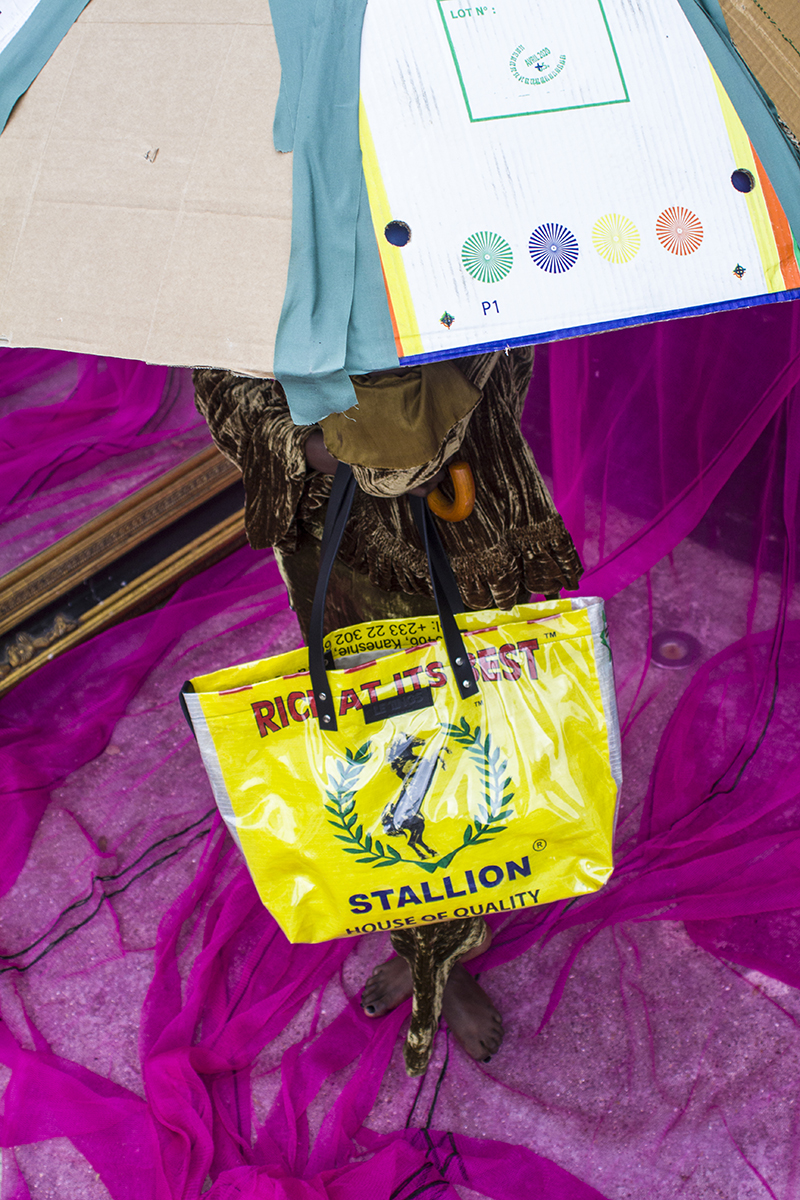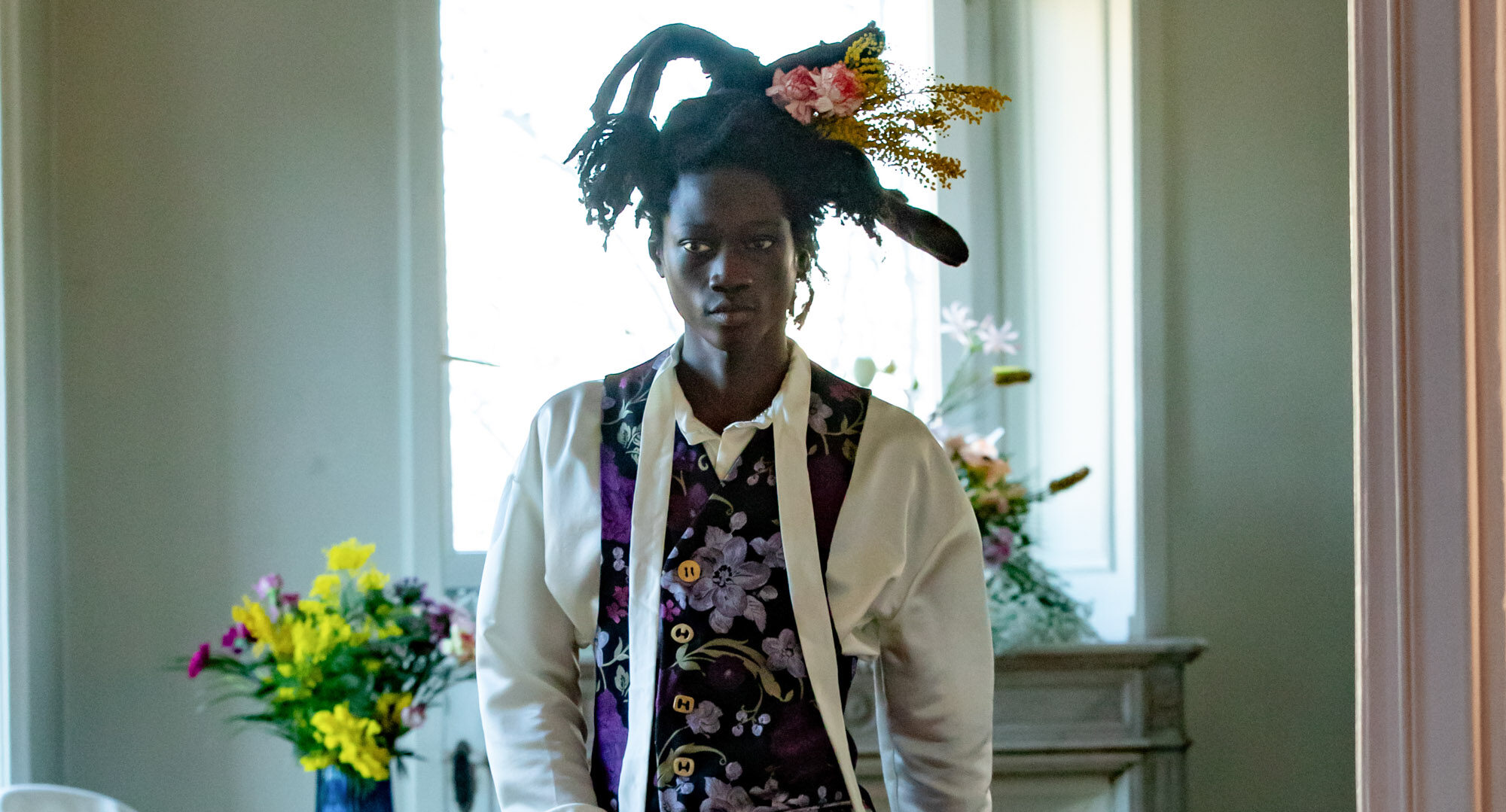Yegwa Ukpo is taking on tech feudalism with his compassionate warrior project Rhizopunk
Words by Helen Jennings
“How do I make something that doesn’t exist here at the moment that would be very cool if it did?” poses Yegwa Ukpo. “How do I create something that serves as an infrastructure for other people to build brighter futures?” He’s referring to the jump-off point for his latest sustainability project, Rhizopunk. But this pioneering thinker has always asked – and answered – this same question with each of his revolutionary concepts. A quiet giant of Nigeria’s creative scene for well over a decade, Ukpo’s vision has always broken new ground where others can thrive.
With a background in web and graphic design, he helmed an advertising and branding agency before opening Lagos menswear store Stranger in 2013. This concept space was ahead of its time, home to experimental local designers (Kenneth Ize, Orange Culture, U.MI-1) alongside their Japanese and Belgian counterparts (Yohji Yamamoto, Ann Demeulemeester, Comme des Garçons) as well as a library, café, indigo dyeing pit, workshops and more. “It went through many mutations but always remained a place where young creatives could come, learn and have conversations,” he recalls of Stranger’s nurturing role for the city’s nascent artists.

By the time Stranger shuttered in 2018, Ukpo was ready to more directly address the issues of sustainability and consumerism tied to contemporary design in all its guises – all driven by capitalist desires prescribed by the Global North. “I started to research Nigeria’s traditional design practices and the guild systems in indigenous societies, which functioned as spaces of learning and spiritual development. They resulted in objects that not only had an aesthetic value but cultural utility as well. Whether used for hunting, religious ceremonies, childbirth or denoting a certain standing in society, they each held a knowledge that those societies depended upon.”

This research fed into Newtype, a “maintenance practice drawing on ancestral wisdom ecologies” to find liberating design approaches with relevance for today. This philosophy uses the concept of ‘play’ to transcend proscribed rules and realities and build new mindsets rooted in care – for one another and the world around us. Play refers to the game we’re in – understanding existing parameters. Players are the curious practitioners challenging those perceived notions and pushing beyond. And the ‘Playground’ is where the players can riff, improvise, respond to one another and imagine with intention. “We can’t find solutions to this big issue of sustainability based in inherited systems that are extractive, exploitative and only interested in creating more. So, let’s look back to our own cultures, intuitions and beliefs and let them move us forward,” he asserts.





Taking off during the Covid lockdown, Newtype attracted a robust online community where creators could explore and collaborate. The project became peer-driven and open-source – a realm where intrepid souls could propose healing rituals and routines around craft, food, clothing, shelter and being. Sadly, Ukpo lost is father in 2021, necessitating a time of mourning, and for him to focus on the family business in Calabar. But he took the opportunity to explore the city’s untapped possibilities, and now this irrepressible mind is cooking up the next chapter of his decolonising, climate-responsive practice.

“In Nigeria today, we have problems in the North with the extremist groups enacting wars but if you’re in Lagos or Abuja, it’s like nothing is going on. Meanwhile young people have to prioritise making money over being creative in order to make ends meet. How are we holding together? There is all of this restlessness and yet nothing seems to be building to a critical mass. So, I went back to the founding tenets of Newtype. I started thinking about agriculture and indigenous environmental knowledge to be explored.”
Ukpo considered the fact that in Nigeria, as elsewhere, commercial farmers commonly use GMO seeds and chemical fertilisers, and focus on cash crops such as palm oil and cocoa, which ravages the soil and leaves the country reliant upon food imports. This led him to investigate building informal networks based on inventive composting techniques, and from there to the symbolic importance of rhizomes in the soil. From these embryonic roots, Rhizopunk is taking shape – a speculative movement challenging “dystopian tech futures” by creating alternatives with what we have in the here and now.
Masiva Terkulturo is his fledgling agriculture project in Calabar that addresses the country’s soil crisis. Starting in his own back yard, he’s borrowing the Japanese compositing method of bokashi to ferment organic matter into fertiliser, and developing vermicompost (worm manure) to build a lustrous vegetable garden. “The issues around agriculture are very complex. We need to get rid of these politicians! But I’m saying, let’s just start and see where it takes us in this community, you know?”
“I am a big believer in aesthetics enabling culture”
Meanwhile Atelier Masiva will address the aesthetics of Rhizopunk through desirable clothing and design. For Ukpo, style always goes hand in hand with substance. “I am a big believer in aesthetics enabling culture. If you want people to be interested in something, you have to make it look sexy, right? From the overalls to the greenhouses, farming must look good,” he smiles. “I’ve always been interested in the intersection of workwear and fashion, and think functional clothing is an area that Nigerian brands could explore. I can imagine This Is Us making great agricultural silhouettes.”
And looking ahead even further to Rhizopunk’s role in education, Ukpo continues to contemplate guilds with the dream of developing rural centres for farming, carpentry, weaving and dying as well as digital skillsets. “Joining these guilds would mean you have a certain level of training and a certain level of quality is expected from you. As such, there would be uniforms for its members, and ceremonies that would appeal to Nigerians’ love of regalia. In that way, everyone has a dignity defined by your role in society.”
Influenced by designer Yokoi Gunpei’s idea of Kareta Gijutsu no Suihei Shikō (lateral thinking with withered technology), Rhizopunk proposes the use of proven tools in creative ways, rather than incessantly chasing tech innovation. It’s about building dynamic, ever-evolving environments that can, if loved and cultivated, lead to better days. Like Stranger before it, which was an anomaly when it first opened but left a legacy that continues to inspire Lagos’s swelling ethical style conversation, Rhizopunk leads the charge for change today. Ukpo is getting his hands dirty, still, as he digs these earthy foundations using ancestral intelligences with the potential to be transformative for all.
„Wie lässt sich etwas erschaffen, das es hier noch gar nicht gibt – das aber großartig wäre, wenn es existierte?“ fragt Yegwa Ukpo. „Wie lässt sich eine Struktur bauen, die anderen ermöglicht, ihre eigene, hellere Zukunft zu gestalten?“
Diese beiden Fragen sind für Ukpo mehr als ein Leitmotiv. Sie sind der Ausgangspunkt für jedes seiner Projekte – zuletzt für Rhizopunk, sein neuestes Experiment an der Schnittstelle von Nachhaltigkeit, Kultur und Zukunftsdenken. Seit über einem Jahrzehnt gilt der gebürtige Nigerianer als stiller Visionär der westafrikanischen Kreativszene – jemand, der Räume öffnet, in denen andere wachsen können.
Ukpo begann als Web- und Grafikdesigner, gründete eine Branding-Agentur und schuf 2013 in Lagos etwas, das es so noch nicht gab: Stranger, eine Mischung aus Concept Store, Galerie, Café und Labor. Hier präsentierte er junge nigerianische Designer wie Kenneth Ize, Orange Culture oder U.MI-1 – Seite an Seite mit Avantgardisten aus Japan und Belgien: Yohji Yamamoto, Ann Demeulemeester, Comme des Garçons. Dazu eine Bibliothek, eine Indigo-Färbegrube, Workshops. „Stranger war nie nur ein Laden“, sagt Ukpo rückblickend. „Es war ein Ort, an dem junge Kreative zusammenkommen, voneinander lernen, reden, ausprobieren konnten.“
Als Stranger 2018 schloss, wollte Ukpo weitergehen. Ihn beschäftigte die Frage, wie Design, Konsum und Nachhaltigkeit miteinander verwoben sind – und wie sehr diese Systeme von kapitalistischen Mustern des globalen Nordens bestimmt werden. Er begann, in Nigerias Vergangenheit zu graben: in traditionelle Handwerksformen und die alten Zünfte indigener Gemeinschaften, die Wissen, Spiritualität und Gestaltung miteinander verbanden. „Diese Objekte waren nie bloß schön“, sagt er. „Sie hatten immer auch Bedeutung, Funktion, eine Aufgabe im Leben der Menschen – vom Jagen bis zu religiösen Ritualen.“
Aus dieser Recherche entstand Newtype, eine Philosophie, die Ukpo als „Pflegepraxis“ beschreibt: ein Denken, das auf das Wissen der Ahnen zurückgreift, um neue Wege zu finden, wie Design heilen, befreien, verbinden kann. Der Schlüsselbegriff lautet Spiel – als Haltung, als Methode, als offenes Feld. Play ist das Spiel selbst, das Erkennen der Regeln. Players sind die, die diese Regeln hinterfragen. Und der Playground ist der Raum, in dem neue Ideen entstehen.
„Wir werden die Probleme der Nachhaltigkeit nicht lösen, solange wir in alten, ausbeuterischen Systemen verharren, die nur auf Wachstum aus sind“, sagt Ukpo. „Also müssen wir zurückschauen – auf unsere eigenen Kulturen, auf unsere Intuitionen – und sie als Kompass für das Morgen begreifen.“
Während der Pandemie wurde Newtype zur digitalen Gemeinschaft. Kreative trafen sich online, um Rituale, Routinen und kleine Praktiken des Heilens zu teilen – in Küche, Garten, Kleidung, Handwerk, Leben. Dann, 2021, starb Ukpos Vater. Er zog sich zurück nach Calabar, um zu trauern und das Familienunternehmen zu übernehmen. Doch selbst dort fand er neue Ideen: im Boden, in der Landwirtschaft, in den ungenutzten Möglichkeiten der Stadt.
„Nigeria ist ein Land voller Gegensätze“, sagt er. „Im Norden herrscht Krieg, doch in Lagos oder Abuja scheint das Leben weiterzugehen, als wäre nichts. Junge Menschen müssen Geld verdienen, statt kreativ zu arbeiten. Überall Unruhe – aber kein Aufbruch. Also habe ich überlegt, wie wir wieder Wurzeln schlagen können. Im wahrsten Sinne.“
Ukpo begann, sich mit Boden zu beschäftigen – im ganz praktischen Sinn. Mit der Frage, warum die nigerianische Landwirtschaft von importiertem Saatgut, chemischen Düngern und Exportpflanzen wie Palmöl und Kakao abhängig ist. Die Böden verarmen, das Land wird zum Konsumenten seiner eigenen Rohstoffe. Aus dieser Analyse wuchs die Idee von Rhizopunk – ein Konzept, das das Wurzelgeflecht (das Rhizom) als Symbol für Gemeinschaft, Resilienz und Selbstermächtigung nutzt.
Sein erstes konkretes Projekt heißt Masiva Terkulturo, eine kleine Agrarinitiative in Calabar. In seinem eigenen Garten experimentiert Ukpo mit der japanischen Bokashi-Methode, die organische Abfälle zu nährstoffreichem Kompost fermentiert. Er züchtet Regenwürmer, baut Gemüse an, teilt Wissen. „Die Landwirtschaft ist ein kompliziertes System“, sagt er. „Aber wir müssen irgendwo anfangen – hier, gemeinsam, im Kleinen.“
Parallel entsteht Atelier Masiva, das die ästhetische Seite von Rhizopunk erkundet. Kleidung, Design, Funktion – alles verbunden. „Ich glaube fest daran, dass Ästhetik Kultur ermöglicht“, sagt Ukpo. „Wenn man Menschen für etwas begeistern will, muss es auch schön sein. Selbst Landwirtschaft. Selbst Arbeit.“ Er lacht. „Ich war immer fasziniert von Arbeitskleidung – sie ist praktisch, ehrlich, voller Würde. Warum nicht daraus Mode machen?“
Langfristig will Ukpo neue Formen von Bildung etablieren: Zünfte, in denen Handwerk, Landwirtschaft, Textilkunst und digitale Fähigkeiten zusammenkommen. „Wer Teil einer solchen Gilde ist, hat Ausbildung, Qualität, Würde. Es gäbe Uniformen, Rituale, Gemeinschaft – Dinge, die Menschen zusammenhalten. So entsteht Identität, Stolz, Zugehörigkeit.“
Inspiriert ist Ukpo von der japanischen Idee des lateral thinking with withered technology – also dem kreativen Umgang mit bewährten, nicht mehr „modernen“ Werkzeugen. Innovation, sagt er, muss nicht immer neu sein. Oft reicht es, Bestehendes neu zu sehen.
Wie einst Stranger steht auch Rhizopunk heute für einen Aufbruch. Damals war es ein kleiner Laden, heute ist es ein wachsendes Netzwerk. Ukpo bleibt, was er immer war: ein stiller Umstürzler. Einer, der in Erde greift, um Zukunft zu formen. Und der zeigt, dass Wandel manchmal genau dort beginnt – wo man anfängt, wieder zu wurzeln.


